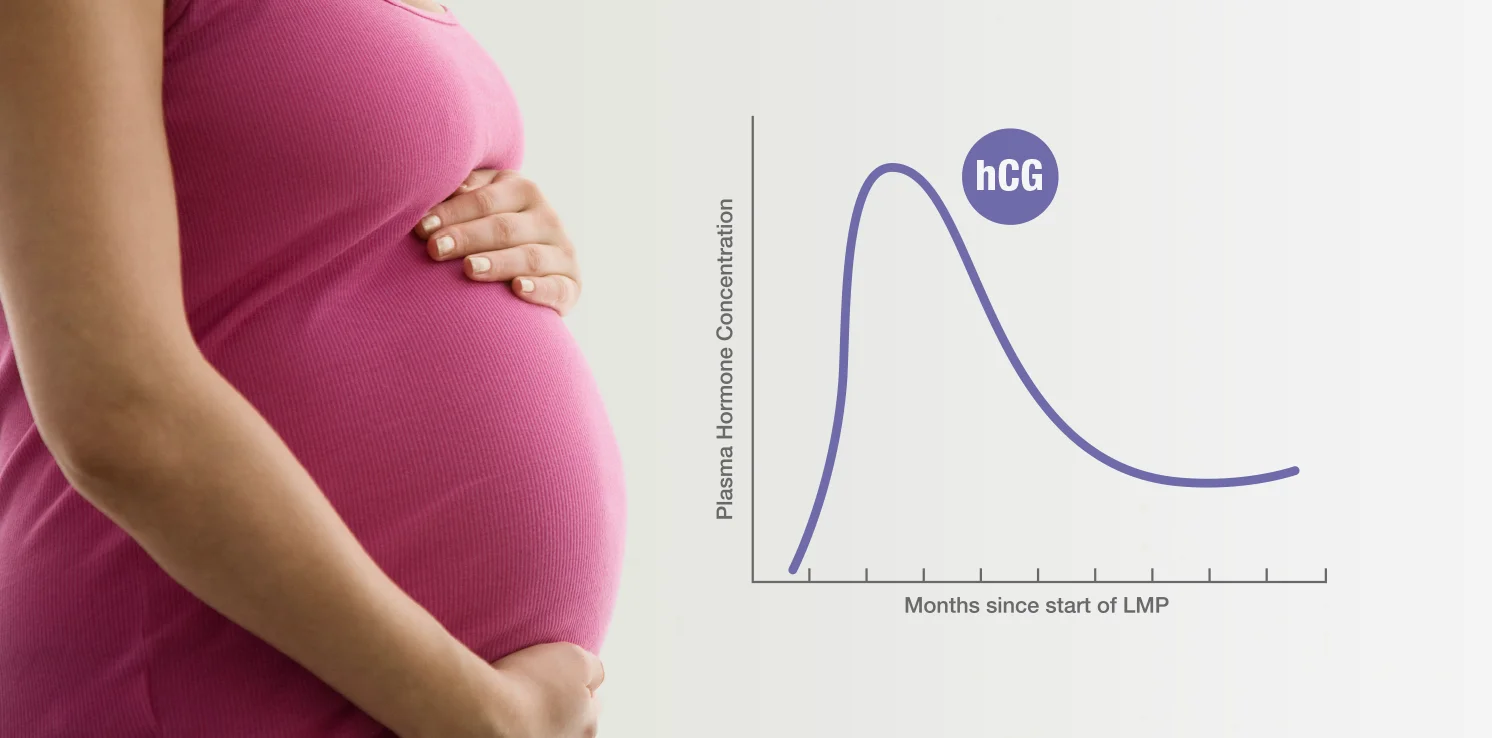Your body’s HCG (Human Chorionic Gonadotropin) levels are one of the first things to change when you become pregnant. Typically, HCG levels follow a pattern, and while exact HCG levels are different for everyone, understanding the metrics and whether or not you fall within the norm can be helpful.
What Is HCG?
HCG (Human Chorionic Gonadotropin) is a hormone the placenta produces during pregnancy. Modern testing equipment can detect HCG levels via blood and urine.
The knowledge that HCG testing provides reaches much further than standard pregnancy confirmation. Doctors can measure HCG and use the metrics to help assess the progress and viability of a pregnancy based on how high, low, or rapidly changing the levels are.
Also, studies have shown that HCG levels can indicate the gender of your baby; however, the results are not consistent or reliable enough to use this as a definitive indicator, much like this fun gender predictor calculator!
Standard HCG Levels
HCG levels fluctuate throughout pregnancy, first increasing and then decreasing. A woman’s HCG levels will typically double every three days until approximately weeks 8-11. At that point, levels will plateau and eventually decline for the remainder of gestation.
HCG levels are measured by milli-international units per milliliter (mIU/mL) and only rise considerably in pregnant women. Below is a chart of standard HCG levels throughout pregnancy.
| Weeks Since Last Menstrual Period | HCG range (mIU/mL) |
| 3 | 5 – 50 mIU/mL |
| 4 | 5 – 426 mIU/mL |
| 5 | 18 – 7,340 mIU/mL |
| 6 | 1,080 – 56,500 mIU/mL |
| 7 – 8 | 7,650 – 229,000 mIU/mL |
| 9 – 12 | 25,700 – 288,000 mIU/mL |
| 13 – 16 | 13,300 – 254,000 mIU/mL |
| 17 – 24 | 4,060 – 165,400 IU/mL |
| 25 – 40 | 3,640 – 117,000 mIU/mL |
Source: The American Pregnancy Association
Frequently Asked Questions About HCG
What Do High HCG Levels Indicate?
Many different aspects of pregnancy can cause high HCG levels. An abnormally high level could indicate a molar pregnancy or even multiple pregnancies (twins, triplets, etc.). High levels can also indicate that you are further along in pregnancy than you previously thought. Although absolute levels vary widely in early pregnancy, you should discuss an extremely high level with your physician.
What Do Low HCG Levels Indicate?
Low HCG levels can indicate that you are not as far along in pregnancy as you originally thought. Because some women ovulate much later in their cycle, the pregnancy calculation by the date of their last menstrual period can be off by several days or even by a week or more.
Some women also just naturally have lower HCG levels in pregnancy, and there is a wide range in the normal values for any given week. However, low HCG levels can sometimes be cause for concern, especially if they are not increasing at the expected rate. Abnormally low or slowly increasing HCG levels could suggest a possible ectopic pregnancy or miscarriage.
What Do Slow Rising HCG Levels Indicate?
The most important factor with HCG levels is the rate of change over the first few weeks, where a rapid increase is typically seen with healthy pregnancies. However, a slow rising HCG level at the beginning of your pregnancy does not necessarily mean that there is an issue. In many cases, women with slow rising HCG levels give birth to healthy babies. Sometimes a slow rising HCG level can be explained by something as simple as miscalculating the starting date of a pregnancy.
Note that consistently slow rising HCG levels can be cause for concern. If you have any questions or worries about your HCG test results, reach out to your healthcare provider.
My HCG Levels are Abnormal. Now What?
One abnormal HGC test does not provide enough information to confirm whether or not a pregnancy is progressing normally. If your HCG level is low, high, or slow-rising, your healthcare provider should re-test you within a few days before drawing any conclusions.
How Often Should HCG Levels Be Checked?
Typically, a healthcare provider will check HCG levels only a couple of times in early pregnancy unless there is reason to suspect there is a potential issue.
If you are considered to have a high-risk pregnancy, have miscarried before, or are actively experiencing severe cramps, pain, or bleeding, your physician may decide to check your HCG levels.
Determining Your Baby’s Gender with Peekaboo
When you use Peekaboo™, you can determine your baby’s gender as early as six weeks gestation! The Peekaboo™ At-Home Early Gender Test is easy, affordable, and accurate. That’s why it’s the only early baby gender reveal test endorsed by the American Pregnancy Association.
Ready to discover your baby’s gender?
Get the Peekaboo At-Home Early Gender DNA Test, proven to be over 99% accurate, and discover your baby’s gender as early as 6 weeks from the comfort of home!


